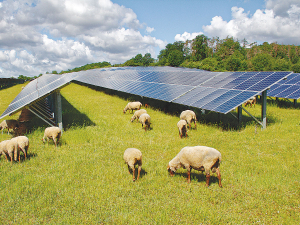New research has found that adding solar panels to sheep and beef farms could improve their profitability and environmental and animal welfare outcomes.
The research investigated ‘agrivoltaics’, the use of land for both food and energy production, with livestock able to graze beneath solar panels.
Canterbury, where the study was focused, has a significant area that is suitable for agrivoltaics.
Agrivoltaics offers solutions to some of the major challenges of solar electricity generation, says research lead Anna Vaughan of agribusiness consultancy Tambo NZ.
“Agrivoltaic systems generate renewable energy without displacing food production,” says Vaughan.
“This dual land-use approach can help farmers play our part in a transition to a net-zero carbon economy, and also become more self-reliant in terms of energy, while adding a new income stream on-farm,” she adds.
Agrivoltaic systems can be designed to maximise the production of both pasture and solar energy, to create win-wins for both production systems. The generated electricity can be used on-farm, and in larger systems can generate enough electricity to be sold back to the national grid.
The project team carried out case study analyses on a dairy farm and a sheep and beef farm, both in Canterbury.
Analysis of the case study sheep and beef farm found there was a significant opportunity to increase profitability.
Adding solar panels to a 6-hectare sheep paddock could increase income for the farm by close to $1 million, with net profit (after debt servicing and depreciation) increasing over $420,000. The solar panels were assumed to be funded through borrowing, which would increase the farm’s loan debt by $5.6 million.
The dairy farm case study was found to have a much smaller impact on farm profitability. This is because the solar panels would need to be elevated for larger livestock to graze underneath, which would increase expenses and risk of wind shear. Incorporation of solar generation on dairy farms might be best suited to non-productive areas of the farm or on shed roofs, found the study.
The research identified both potential benefits and downsides to adding solar electricity production to a farm system.
Benefits included keeping land in food production, animal welfare (panels provide shade to mitigate heat stress risk, and shelter from harsh weather), even shade distribution reducing the nutrient effects of livestock camping, improved water use efficiency by reducing evaporation, and cost-control and resilience of farm electricity supply.
Capital cost is a significant barrier to farmers. A potential solution is in a partnership or leasehold arrangement, where a third party owns and manages the solar plant, paying a lease to the landholder.
Other downsides identified by the research team included risk of damage to panels from livestock, limitations to future land-use change, uncertainty regarding farm resale value, and lifecycle impacts of PV panels (such as mining, transport, and end-of-life disposal).
The effects of solar panels on crop and pasture yields require New Zealand-specific research, as the impacts could be either positive (reduced soil temperatures increasing yields, or micro-climate effects creating a new high-value crop opportunities) or negative (shading reducing yields).
Solar panels have an expected lifespan of 30 years, with the required inverter possibly needing replacement during that time. The project modelled depreciation of the solar panels over 30 years, and did not include costs beyond that time (either installing new panels, or panel removal, disposal and land remediation).


















